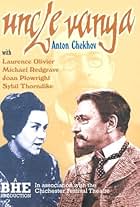Advanced search
- TITLES
- NAMES
- COLLABORATIONS
Search filters
Enter full date
to
or just enter yyyy, or yyyy-mm below
to
to
to
Exclude
Only includes titles with the selected topics
to
In minutes
to
1-6 of 6
- Retired Professor Alexander Serebryakov has returned to his estate to live with his beautiful young wife, Yelena. The estate originally belonged to his first wife, now deceased. Her mother and brother still live there and manage the farm. For many years, the brother, Uncle Vanya, has sent the farm's proceeds to the professor, while receiving only a small salary himself. Sonya, the professor's daughter, who is about the same age as his new wife, also lives on the estate. The professor is pompous, vain, and irritable. He calls Dr. Astrov to treat his gout, only to send him away without seeing him. Astrov is an experienced physician who performs his job conscientiously, but has lost all idealism and spends much of his time drinking. The presence of Yelena introduces a bit of sexual tension into the household. Astrov and Uncle Vanya both fall in love with Yelena. She spurns them both. Meanwhile, Sonya is in love with Astrov, who fails even to notice her. Finally, when the professor announces he wants to sell the estate, Vanya, whose admiration for the man died with his sister, tries to kill him.
- Complete shooting of the iconic avant-garde theatre production of Akropolis by Teatr Laboratorium-Wroclaw (Poland). The performance is based on Stanislaw Wyspianski's poetic drama written between 1903 and 1904, and set on the night of Easter Saturday with works of art in the Wawel Cathedral in Kraków coming to life. Wyspianski's text combines Biblical themes, Homeric sequences and Mediterranean culture with themes from Polish history. Grotowski's version transferred the play in a concentration camp. In the performance, then, Auschwitz became our Acropolis - a synthesis of the contemporary age - whereby the grand myths of Western civilization are confronted with the Holocaust. Shown for the first time in October 1962 in Opole, Poland, the performance underwent numerous changes in the following years. This TV recording takes the fifth and final version, which was first performed in 1967 in Wroclaw, and then toured throughout Europe and eventually New York.
- The German village of Rhina was about half Jews in the 1920s, but its residents in 1981 cannot quite recall how or why their neighbors disappeared after 1939. Rhina's Jewish survivors in NYC are also interviewed.
- On a stage, actors prepare to perform Edward Petherbridge's vignette play based on R.D. Laing's 1970 book about the common psychological knots and hang ups that make human communication much harder than it needs to be.


